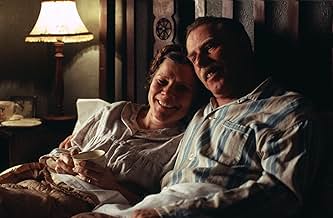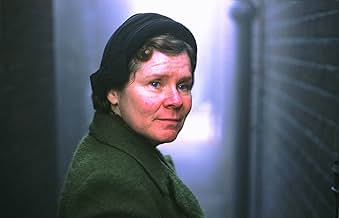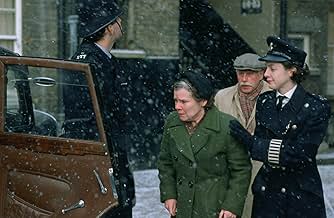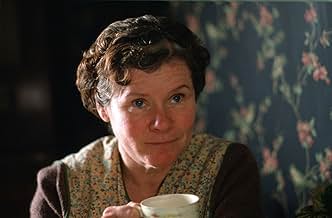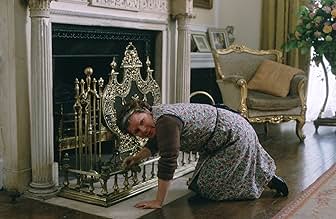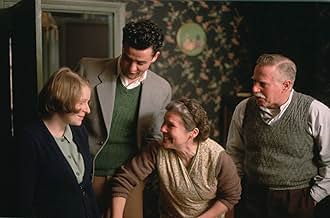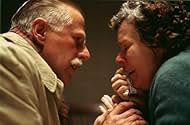Vera Drake
- 2004
- Tous publics
- 2h 5min
NOTE IMDb
7,6/10
28 k
MA NOTE
La faiseuse d'anges Vera Drake découvre que ses croyances et ses pratiques se heurtent aux moeurs de l'Angleterre des années 50? un conflit qui conduira à la tragédie pour sa famille.La faiseuse d'anges Vera Drake découvre que ses croyances et ses pratiques se heurtent aux moeurs de l'Angleterre des années 50? un conflit qui conduira à la tragédie pour sa famille.La faiseuse d'anges Vera Drake découvre que ses croyances et ses pratiques se heurtent aux moeurs de l'Angleterre des années 50? un conflit qui conduira à la tragédie pour sa famille.
- Nommé pour 3 Oscars
- 41 victoires et 45 nominations au total
Sinead Matthews
- Very Young Woman
- (as Sinéad Matthews)
Avis à la une
"Vera Drake" makes us realize how few of the classic kitchen sink, working class dramas of post-war Britain, whether in film or theater, were from the viewpoint of women ("Georgy Girl" and "A Taste of Honey" were among the few). Oh, girlfriends got knocked up in those works, but they were always seen as manipulative strangleholds to the freedom of the Angry Young Men; they should just take care of it.
With exquisite attention to complete period detail in body language, coloring, clothes, physical surroundings, etc. that fill the screen as much as he did theatrically in re-creating "The Mikado" in "Topsy Turvy," Mike Leigh takes us to the other side of that doorway that the older movies rarely showed us, (though in the '60's the original "Alfie" and the schmaltzier Hollywood "Love with the Proper Stranger" gave us an exaggerated view). The film also works in tandem with Peter Mullan's "The Magdalene Sisters" in showing how cruel life in Ireland and Britain could be for women with unwanted pregnancies, though evidently this film is not a docudrama.
This complete mise en scene (including contrasts with the upper crust families she works for as a domestic) very gradually gives us the matter of fact quotidian of Drake's mundane life of caring for her family and the neighborhood unfortunates, including girls she "helps out."
Imelda Staunton's self-effacement into the role and her character's into her environment doesn't prepare us for how she comes to completely overwhelm us.
Leigh created a similar working class world in "All of Nothing," but that film had no trajectory, virtually nothing happened to those characters, and none of the characters were as completely sympathetic as naive Drake is. It is wonderful to see a character actress get to fill the screen for long, emotional close-ups. The audience in the almost sold out theater I was in was completely gripped in silence and holding their breath as her life played out. Too bad the hot subject matter of abortion will probably keep her from getting an Academy Award.
Because of the vivid realism in the film, it is frustrating that there is no factual information provided, for example, as to when abortions became legally available to all women in Britain. A few facts are thrown out about enforcement and consequences, but those are anecdotal, though the class differences are portrayed vividly.
One is left with complete sadness that for all the specificity of time and place in the film, we could easily go back to a time like this when abortions are illegal and unsafe, because there will always be women who feel that is their only option, whether single, married, poor or rich. The past is prologue to the future.
With exquisite attention to complete period detail in body language, coloring, clothes, physical surroundings, etc. that fill the screen as much as he did theatrically in re-creating "The Mikado" in "Topsy Turvy," Mike Leigh takes us to the other side of that doorway that the older movies rarely showed us, (though in the '60's the original "Alfie" and the schmaltzier Hollywood "Love with the Proper Stranger" gave us an exaggerated view). The film also works in tandem with Peter Mullan's "The Magdalene Sisters" in showing how cruel life in Ireland and Britain could be for women with unwanted pregnancies, though evidently this film is not a docudrama.
This complete mise en scene (including contrasts with the upper crust families she works for as a domestic) very gradually gives us the matter of fact quotidian of Drake's mundane life of caring for her family and the neighborhood unfortunates, including girls she "helps out."
Imelda Staunton's self-effacement into the role and her character's into her environment doesn't prepare us for how she comes to completely overwhelm us.
Leigh created a similar working class world in "All of Nothing," but that film had no trajectory, virtually nothing happened to those characters, and none of the characters were as completely sympathetic as naive Drake is. It is wonderful to see a character actress get to fill the screen for long, emotional close-ups. The audience in the almost sold out theater I was in was completely gripped in silence and holding their breath as her life played out. Too bad the hot subject matter of abortion will probably keep her from getting an Academy Award.
Because of the vivid realism in the film, it is frustrating that there is no factual information provided, for example, as to when abortions became legally available to all women in Britain. A few facts are thrown out about enforcement and consequences, but those are anecdotal, though the class differences are portrayed vividly.
One is left with complete sadness that for all the specificity of time and place in the film, we could easily go back to a time like this when abortions are illegal and unsafe, because there will always be women who feel that is their only option, whether single, married, poor or rich. The past is prologue to the future.
One observation: When the police arrive at the home of Vera Drake (Imelda Staunton) to confront her about the allegation that she has been conducting illegal abortions, she and her family are celebrating her daughter's engagement. When the cops enter the room, the camera freezes on Vera's face. Over the course of about 45 seconds in which she doesn't say a word, Staunton's face registers every possible emotion: Joy, confusion, concern, fear, disgust, anger, guilt. It's heart-racing just to watch, and it's what acting -- great acting at least -- is all about. Staunton's is the one female performance of the year not to miss. (On the men's side, check out Morgan Freeman in MILLION DOLLAR BABY.)
Vera Drake (Imelda Staunton) is a kind helpful mother and wife to a working-class family. She invites Reg (Eddie Marsan) for dinner and sets him up with daughter Ethel (Alex Kelly). Reg served in the war as well as her husband (Phil Davis) and son (Daniel Mays). She helps the local women with abortions. Unbeknownst to her, black marketeer Lily (Ruth Sheen) charges those women. In a parallel story, Vera also cleans the house of a government minister. The shy daughter Susan (Sally Hawkins) is raped during a date. She is desperate to get rid of her pregnancy and her friend directs her to a higher cost abortion where a psychiatrist uses her aunt's suicide as grounds to terminate.
Mike Leigh delivers a movie full of humanity. Imelda Staunton is simply brilliant. I would have liked Susan's story to be more connected with Vera. Obviously, Leigh is making a point about the state of abortion for the different classes but it's not quite clear enough. Overall, Staunton overwhelms this movie with her humanity and kindness.
Mike Leigh delivers a movie full of humanity. Imelda Staunton is simply brilliant. I would have liked Susan's story to be more connected with Vera. Obviously, Leigh is making a point about the state of abortion for the different classes but it's not quite clear enough. Overall, Staunton overwhelms this movie with her humanity and kindness.
Imelda Staunton is superb and is my bet for the Oscar unless some Hollywood Diva does another "out of character" performance. But she only shines because of the company she keeps.This is ensemble acting at it's finest. No melodramatics, no attempt to steal scenes,and the result is as honest as life itself. This is the way the British talked, almost always indirectly, hedging around issues rather than hitting them head on, and a slave to mannered behavior. Understate, understate, understate.
Having lived in England from 1952 to 1959, and having married someone who was British who grew up during the war and it's aftermath this movie was like "a bit of old home." My mother employed "char ladies" like Vera, although we were "upper middle class" rather than "upper." The class differences were quite distinct in those days, and often determined by accent. What this movie shows is not only the average life of a "lower class" family but the options forced on them that were different from those in the higher brackets of society.
As anyone should know by know the movie is about illegal abortion in a rigid
puritanical society. Illegal, that is, for those without means, but quite available to those who could grease the wheels of the medical establishment who had "legal" ways around the law. In other words if Roe v. Wade goes then Vera's will pop up again.
There is no attempt to make a statement for or against abortion. As Mike Leigh has said: abortion has been in every society for thousands of years. The Vera Drake's who have lived could populate a small city. What this movie does do is emphasize that the Vera's were/are common average people not quasi criminals lurking behind the curtains of some seedy back alley shack, and that legislating morality never addresses the often harsh reality of human society.
Having lived in England from 1952 to 1959, and having married someone who was British who grew up during the war and it's aftermath this movie was like "a bit of old home." My mother employed "char ladies" like Vera, although we were "upper middle class" rather than "upper." The class differences were quite distinct in those days, and often determined by accent. What this movie shows is not only the average life of a "lower class" family but the options forced on them that were different from those in the higher brackets of society.
As anyone should know by know the movie is about illegal abortion in a rigid
puritanical society. Illegal, that is, for those without means, but quite available to those who could grease the wheels of the medical establishment who had "legal" ways around the law. In other words if Roe v. Wade goes then Vera's will pop up again.
There is no attempt to make a statement for or against abortion. As Mike Leigh has said: abortion has been in every society for thousands of years. The Vera Drake's who have lived could populate a small city. What this movie does do is emphasize that the Vera's were/are common average people not quasi criminals lurking behind the curtains of some seedy back alley shack, and that legislating morality never addresses the often harsh reality of human society.
I have been a longtime fan of Mike Leigh, always fascinated to see his slice of life take on England. Because of his well known creative process, the intrigue would be to see the actors and the characters and dramas (and comedies) they created. They were always worth watching in a voyeuristic way due to Leigh's unobtrusive camera work.
Vera Drake is well worth seeing for these same reasons, but Leigh has made a bigger and better movie than ever before, even with all of Topsy Turvy's bombast. His ambitions as director are greater than ever. First of all, to take on the subject of abortion is very brave. But I'll leave that for others to discuss. What was of interest to me from the opening shot was that this was going to be a visual tour de force, and it was.
Painting the scenes in dark, crushing browns and greens, with tight camera angles or letting the light in, each scene had the feel of a well thought out canvas, even the cut aways between scenes were new, inventive and beautiful.
And the acting is great and the scenes of the family interacting in close quarters, moving in synch are so pitch perfect you feel they have been doing this for decades.
So if you're thinking of seeing this movie, sit back, relax, and prepare to be taken on a slow, masterful ride.
Vera Drake is well worth seeing for these same reasons, but Leigh has made a bigger and better movie than ever before, even with all of Topsy Turvy's bombast. His ambitions as director are greater than ever. First of all, to take on the subject of abortion is very brave. But I'll leave that for others to discuss. What was of interest to me from the opening shot was that this was going to be a visual tour de force, and it was.
Painting the scenes in dark, crushing browns and greens, with tight camera angles or letting the light in, each scene had the feel of a well thought out canvas, even the cut aways between scenes were new, inventive and beautiful.
And the acting is great and the scenes of the family interacting in close quarters, moving in synch are so pitch perfect you feel they have been doing this for decades.
So if you're thinking of seeing this movie, sit back, relax, and prepare to be taken on a slow, masterful ride.
Le saviez-vous
- AnecdotesExcept for Imelda Staunton, none of the actors knew the film was about abortion until their characters found out.
- GaffesVera's sister-in-law Joyce says she wants a washing machine which costs "25 pounds." Until decimalization in 1971, most luxury goods, like washing machines and men's suits, were priced in guineas, not pounds (one guinea = one pound one shilling, or one pound five pence in decimal). Some stores, particularly those wishing to appeal to the middle class or aspiring to a degree of 'poshness', priced items in pounds. Throughout the 1960s most domestic items were priced in pounds, shillings, and pence. Services and professions continued to charge in guineas until much later. In the film, an abortion costs two guineas.
- Bandes originalesSalut D'Amour (Liebesgruss), Op.12
(1888)
Written by Edward Elgar
By permission of Schott & Co Limited, London
Performed by Rosemary Warren-Green (violin) and Ian Brown (piano)
Meilleurs choix
Connectez-vous pour évaluer et suivre la liste de favoris afin de recevoir des recommandations personnalisées
- How long is Vera Drake?Alimenté par Alexa
Détails
- Date de sortie
- Pays d’origine
- Langue
- Aussi connu sous le nom de
- El secreto de Vera Drake
- Lieux de tournage
- Sociétés de production
- Voir plus de crédits d'entreprise sur IMDbPro
Box-office
- Budget
- 11 000 000 $US (estimé)
- Montant brut aux États-Unis et au Canada
- 3 775 283 $US
- Week-end de sortie aux États-Unis et au Canada
- 13 207 $US
- 10 oct. 2004
- Montant brut mondial
- 13 267 869 $US
- Durée
- 2h 5min(125 min)
- Couleur
- Mixage
- Rapport de forme
- 1.85 : 1
Contribuer à cette page
Suggérer une modification ou ajouter du contenu manquant


